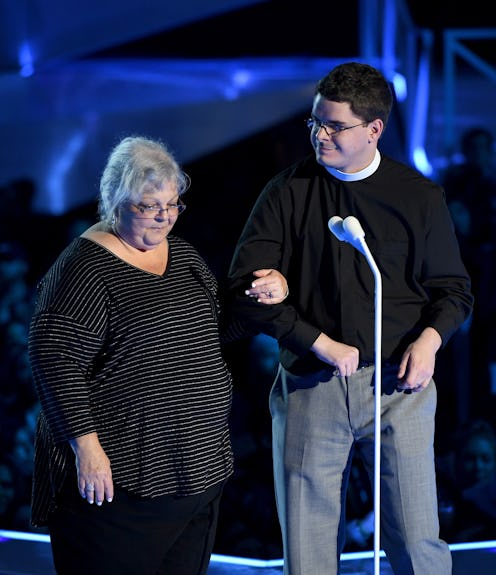Entertainment
This 2017 VMAs Moment Proves Exactly Why Awards Shows Must Get Political

In the last couple of years, it has become standard, if not expected, for current events and political issues to be addressed during award shows. It was no different at the 2017 VMAs, during which celebrities took the opportunity to speak about gender politics, the lives lost in Hurricane Harvey, and the violent white supremacist movement that reared its head in Charlottesville. And, as is also standard, it didn't take people on Twitter long to express exhaustion and frustration that they can't even enjoy a simple awards show without having politics shoved into their faces. But the very reason why it's crucial that even award shows be political was displayed when Rev. Robert Wright Lee IV denounced white supremacy during the ceremony. Not only was it remarkable to see a descendant of Robert E. Lee taking a stronger stance on white supremacists than our own president, it was remarkable to realize that we are at the point as a country where a white man has to stand on a stage and explain to people that racism is bad.
Now, the political fatigue is a very real thing. The news is relentlessly bad every day, to the point where you almost miss hearing just about small local crimes and incidences that don't have countrywide impact. (Not really. But really.) Transgender troops are being banned from the military. Immigrants from Muslim nations are being banned from entering the United States. Trump is still trying to build a wall between the United States and Mexico. A hate group can run over a woman with a car and have the president state that there was violence and hate on "many sides." I want to bury my head in the sand and hide from that, too. But I can't. Not all the time, and especially not at awards shows, when millions of people are watching and the opportunity to make an impact is huge.
First of all, celebrities are American citizens in the same way that viewers are. They're being affected by the same policies and bad news as we are, and, as happy as they are to be honored for their music, they are also lucky to have a platform from which to speak. It's their right, maybe even their obligation in some cases, to use that platform to talk not just about music, or about who got them where they are, but about issues that matter to them. It's their right to talk to their fan base about the things that were bothering them before the ceremony and will bother them again after the ceremony. It's their right to have an opinion about the future of our country, and their right to express that opinion when they're literally handed a microphone and told to speak.
And, most importantly, award shows aren't just for the people being honored — or even just for people like me. They're for people older than me and for people younger than me. They're something that unites people from all walks of life. Millions of people tune in to watch award shows every year, and that's millions of eyes and ears and minds and hearts that can be reached. Sure, we go into award shows expecting frivolity, but just like you've likely been moved by a particularly amazing performance or compelling piece of stage artwork, so too might someone be moved by a particularly powerful speech or empathetic moment at an award ceremony.
It's easy to dissociate from the news when bad things happen every day, but it's not as easy to dissociate from real people that you are looking at and listening to — even if they're famous. In fact, their words might have more weight to you because they're famous, because you idolize them, because they're role models.
The fact of the matter is that we live in a world where we still, apparently, need Robert E. Lee's descendant to explain to those that didn't already know that hate, white supremacy, and racism can lead to tragedies like Charlottesville, and can still impact us and damage us even when they don't. We still, apparently, live in a world where President Trump can give a comparatively thoughtful speech about Charlottesville and then, in the same week, appear to show sympathy and kinship with the racists responsible for those events. We live in a world where people can advise those caught in Hurricane Harvey to just move, as if that's possible for every socioeconomic class.
We still live in a world with issues a lot more serious than being annoyed that your award show viewing was interrupted by a political statement. So, maybe you find it annoying and exhausting and even exasperating that you can't enjoy a simple award show without being reminded that there's a whole world outside that's metaphorically on fire. But, now more than ever, we need everyone at every stage in their life to stay woke. We need people to be thinking about and speaking on these issues, to raise awareness and spread empathy. We need celebrities and viewers, teenagers and senior citizens, and people of every ethnicity and walk of life to pay attention to these issues, even and maybe especially when they don't want to. Maybe then and only then we'll live in a world where a white man doesn't need to explain to anyone how harmful racism can be.